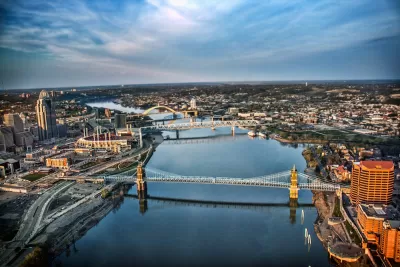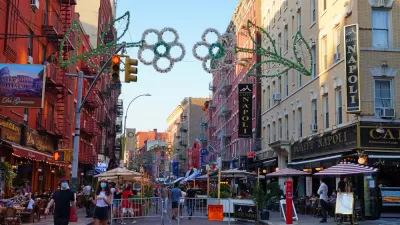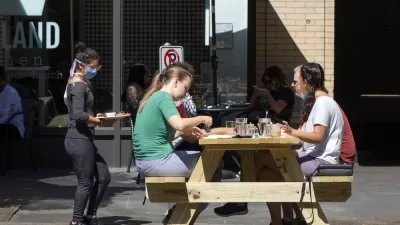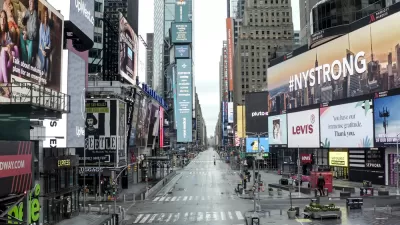Since the outbreak of the Covid-19 pandemic, there has been shortage of opinions on the coming evolution of cities. It’s time to check in with the debate.

“It takes a lot to kill a city,” says Mary Rowe, president and CEO of the Canadian Urban Institute, at the beginning of a recent Vox article that provides a roundtable discussion of experts on cities. The premise of the discussion: What is the future of cities, cutting through the culture war talking points and political propaganda that has dominated the discussion as the country emerges in fits and starts from the Covid-19 pandemic.
Here are the other experts cited in the article:
- Mary Rowe – “president and CEO of the Canadian Urban Institute”
- Richard Florida – “an urbanist and professor at the University of Toronto’s Rotman School of Management”
- Nicholas Bloom – “a Stanford economics professor who studies remote work”
- Emily Talen – “a professor of urbanism at the University of Chicago”
- Connor O’Brien – “Economic Innovation Group research associate”
- Ellen Dunham-Jones – “a professor and director of the urban design program at Georgia Tech’s architecture school”
- Esteban Rossi-Hansberg – “a professor in the University of Chicago’s economics department”
- Matthew Kahn – “an economics professor at the University of Southern California”
- Dror Poleg – “economic historian”
- Kenan Fikri – “research director at Economic Innovation Group”
- Arpit Gupta – “an associate professor of finance at NYU Stern”
For those keeping track at home, here are the number of times the article, between author and experts, mentions the following terms:
Climate: 3
Car(s): 1
Density: 1
Housing: 11
Transit: 5
Remote Work: 14
Covid: 2
Public Health: 0
Zoning: 1
Crime: 2
Pollution: 0
Air: 0
Water: 1
“Big cities — think New York City, Los Angeles, Chicago — will ultimately be okay, since a lot of what made them attractive in the first place is still there and impossible to find elsewhere. But that doesn’t mean they will — or can — stay the same,” writes post author Rani Molla to summarize the discussion.
“And while the move away from cities is overstated, even small shifts from powerhouses like NYC could represent windfalls for the suburbs, exurbs, and other cities those people choose to move to. That means smaller cities — like Cincinnati or Tulsa or Indianapolis — have a big opportunity to position themselves as destinations for those who do leave big cities, even as the largest urban areas are far from dying,” adds Rowe.
FULL STORY: The future of cities, according to the experts

Planetizen Federal Action Tracker
A weekly monitor of how Trump’s orders and actions are impacting planners and planning in America.

San Francisco's School District Spent $105M To Build Affordable Housing for Teachers — And That's Just the Beginning
SFUSD joins a growing list of school districts using their land holdings to address housing affordability challenges faced by their own employees.

The Tiny, Adorable $7,000 Car Turning Japan Onto EVs
The single seat Mibot charges from a regular plug as quickly as an iPad, and is about half the price of an average EV.

Seattle's Plan for Adopting Driverless Cars
Equity, safety, accessibility and affordability are front of mind as the city prepares for robotaxis and other autonomous vehicles.

As Trump Phases Out FEMA, Is It Time to Flee the Floodplains?
With less federal funding available for disaster relief efforts, the need to relocate at-risk communities is more urgent than ever.

With Protected Lanes, 460% More People Commute by Bike
For those needing more ammo, more data proving what we already knew is here.
Urban Design for Planners 1: Software Tools
This six-course series explores essential urban design concepts using open source software and equips planners with the tools they need to participate fully in the urban design process.
Planning for Universal Design
Learn the tools for implementing Universal Design in planning regulations.
Smith Gee Studio
City of Charlotte
City of Camden Redevelopment Agency
City of Astoria
Transportation Research & Education Center (TREC) at Portland State University
US High Speed Rail Association
City of Camden Redevelopment Agency
Municipality of Princeton (NJ)





























